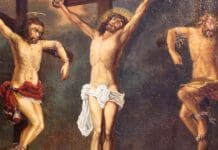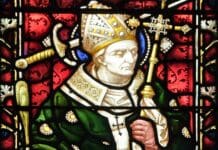 St. Polycarp lived in about 69-155 A.D., and was the Bishop of Smyrna, Izmir in modern Turkey. He was the leading Christian figure in Roman Asia Minor. He is an important link between the tradition of the Church stretch from the apostles to the 2nd century church.
St. Polycarp lived in about 69-155 A.D., and was the Bishop of Smyrna, Izmir in modern Turkey. He was the leading Christian figure in Roman Asia Minor. He is an important link between the tradition of the Church stretch from the apostles to the 2nd century church.
Few details of his life are extant with any reliability beyond his famous martyrdom, which was recounted in the Martyrium Polycarpi. It is believed, however, that he was converted to the faith by St. John the Evangelist about 80 A.D. St. Irenaeus (Bishop of Lyons in 2nd century) tells us that Polycarp sat at the feet of the Apostle St. John. Polycarp also knew others that saw Christ in the flesh. He was appointed to the See of Smyrna by the Apostles themselves about 96 A.D.
He was, as was his friend St. Ignatius of Antioch, one of the most important intermediary links between the apostolic and the patristic eras in the Church, especially in Christian Asia Minor. When Ignatius was being taken to Rome to be put to death, he wrote of Polycarp being clothed “with the garment of grace.” A defender of orthodoxy, he opposed such heretical groups as the Marcionites and Valentinians. He also authored a surviving epistle to the Philippians, exhorting them to remain strong in the faith. The letter is of great interest to scholars because it demonstrates the existence of New Testament texts, with quotes from Matthew and Luke, the Acts of the Apostles, and the first letters of Peter and John.
Persecution broke out in Smyrna. Polycarp was himself arrested by Roman officials in Smyrna soon after returning from a trip to Rome to discuss the date for Easter with Pope Anicetus. When Polycarp heard that his pursuers were at the door, he said, “The will of God be done; ” and meeting them, he begged to be left alone for a little time, which he spent in prayer for “the Catholic Church throughout the world.” As Polycarp was led into the stadium where he was to be martyred, the uproar was so loud that many did not hear the announcement. A voice from heaven came to Polycarp as he was entering the stadium: “Be strong, Polycarp, and play the man!” No one saw the speaker, but many witnesses heard the voice.
The Roman proconsul attempted to persuade Polycarp to worship Caesar and say “Away with the atheists” referring to the Christians – Polycarp looked up to heaven and groaned “Away with the atheists!” refering to the Roman crowds. The proconsul asked him to revile Christ, and Polycarp replied: “I have served Him eight-six years and in no way has He dealt unjustly with me; so how can I blaspheme my King Who saved me?”
Polycarp declared his Christianity and refused any persistence by the proconsul. Many threats were made against him: wild beasts, fire, and any torture possible. Polycarp’s response to these: “You threaten fire which burns for an hour and is soon quenched; for you are ignorant of the fire of the coming judgment and eternal punishment reserved for the wicked. But why do you wait? Come, do what you will!” As Polycarp spoke, he became filled with courage and joy. His face was covered with grace so much so that none of the threats stirred terror in his heart. The crowds shouted that Polycarp should be burned alive—they gathered wood and fuel from shops and baths.
Polycarp readily took off his garments and loosened his belt. He also made an effort to take off his shoes, although he was not used to doing this because the faithful always hurried to take them off so that they may be the first to touch his skin, since he was greatly adorned because of his Godly way of life. As they were about to nail Polycarp, he said: “Let me be as I am; for He who makes it possible for me to endure the fire will also make it possible for me to remain on the pyre unmoved without the security of nails.” Thus, they only bound him, but did not nail him.
Polycarp looked up to heaven and said this last prayer:
“Lord God Almighty, Father of Your Beloved and Blessed Son Jesus Christ, through whom we have received knowledge of You, God of angels and powers and every created thing and all the race of the just who dwell before You. I bless You because You have considered me worthy of this day and hour to receive a portion among the number of the martyrs in the Cup of your Christ unto the resurrection of eternal life, both of soul and body in the incorruption of the Holy Spirit. May I be received among them today as a rich and acceptable sacrifice, just as you have prepared beforehand and revealed beforehand, and fulfilled, O undeceiving and true God. For this reason and for all these things I praise You, I bless You, I glorify You, through the eternal and heavenly high priest, Jesus Christ, Your beloved Son, through whom to You with Him and the Holy Spirit be glory now and forever. Amen.”
When he lifted up the Amen and finished the prayer, the fire was lit. When the flame shot up, a miracle was witnessed: The fire took the form of an arch like the sail of a ship filled by the wind and encircled the body of the martyr like a wall. He was in the center of it not like burning flesh but like baking bread or like gold and silver being refined in a furnace. Those who witnessed this miracle also smelled a fragrant odor like the scent of incense or some other precious spice. When the pagans saw that his body could not be consumed by fire, they ordered the executioner to plunge a dagger into him. When he did this, a large quantity of blood came out—so much that it quenched the fire. Everyone was amazed that there was such a great difference between the unbelievers and the elect, of which Polycarp was a member.
After he departed, the Jews and others created an issue over what was to be done with St. Polycarp’s body—they thought that the faithful believers would begin to worship him, so the centurion decided to burn his body. ”Then,” say the writers of his acts, “we took up the bones, more precious than the richest jewels or gold, and deposited them in a fitting place, at which may God grant us to assemble with joy to celebrate the birthday of the martyr to his life in heaven!”

















Dear St.Polycarp,I am so much inspired by the faith u had in God.please pray for me to learn how to live with strong faith in God and for God to bless me and answer my private intentions. AMEN! St polycarp pray for us.
[…] Джерела: saints.katolik.ru brewiarz.katolik.pl ucatholic.com […]